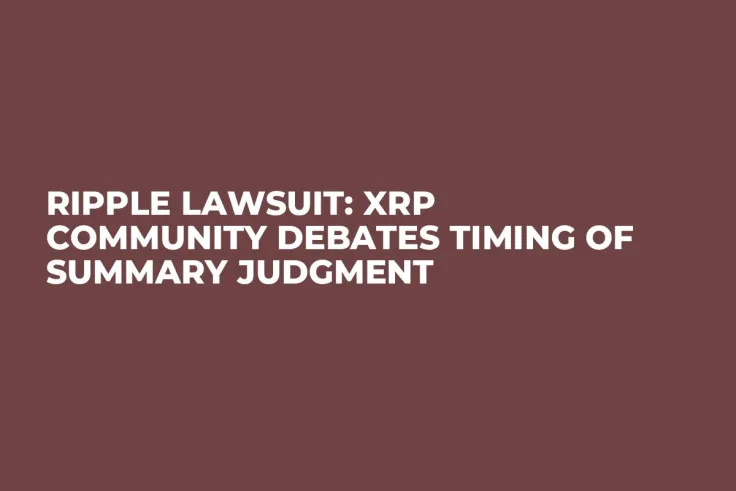
Disclaimer: The opinions expressed by our writers are their own and do not represent the views of U.Today. The financial and market information provided on U.Today is intended for informational purposes only. U.Today is not liable for any financial losses incurred while trading cryptocurrencies. Conduct your own research by contacting financial experts before making any investment decisions. We believe that all content is accurate as of the date of publication, but certain offers mentioned may no longer be available.
Legal experts and the XRP community weighed in on the discussion regarding the likely timing of summary judgment in the Ripple lawsuit.
It should be recalled that in December 2022, briefings for summary judgment in the Ripple case were completed. Now, over six months later, the XRP community eagerly awaits the court's decision and a favorable ruling in the case.
Back to what triggered the debate: a vocal XRP community member, Mr. Huber, shared a screenshot of information he had found online about how long it might take a court to review legal filings and decide on requests for summary judgment.
Mr. Huber shared one of the findings he saw, which stated, "one to three months." The statement read, "A judge usually takes one to three months to consider legal briefs and decide whether to grant or deny a summary judgment." This he reacted to, saying, "Fake news."
The filings in Ripple are 10X the filings in LBRY. Remember also, LBRY’s counsel stipulated that prongs 1 and 2 were satisfied and the only contested prong in the case was prong 3, which has a two-part test (that’s why some people say Howey is a 4 factor test). In Ripple, factor…
— John E Deaton (@JohnEDeaton1) June 26, 2023
His tweet drew the attention of former SEC lawyer Marc Fagel, who concurred that the timeline of one to three months was incorrect while adding that legal research done on the internet might not be factual.
Fagel gives an illustration: in one particular federal district court, summary judgment motions take, on average, about six months, according to the most current review of federal cases he examined. Ripple is approaching seven months.
CryptoLaw founder John Deaton joined in the Twitter discussion and said that Congress would not have started the six-month rule if Federal District courts took an average of one to three months for potentially dispositive motions like summary judgment motions.
Community discusses Ripple timing in comparison to LBRY lawsuit
Neil Hartner, a senior staff software engineer at Ripple working on ODL, added to the discussion, inquiring about the timing of the LBRY lawsuit.
To this, Marc Fagel replied, "About four and a half months," adding that this might be due to the much less voluminous record there.
Hartner added that he recalls those following the LBRY case thinking the judge was taking a long time and speculating that it was a good sign for the defendant. It turned out to be the opposite. He adds that the volume of material to review seems like the only thing to factor into the timing.
CryptoLaw founder John Deaton agreed to this, saying that the filings in the Ripple case are 10 times those of LBRY. He also highlights specific differences between the two lawsuits.
"The filings in Ripple are 10x the filings in LBRY. Remember also, LBRY’s counsel stipulated that prongs 1 and 2 were satisfied, and the only contested prong in the case was prong 3, which has a two-part test (that’s why some people say Howey is a 4-factor test). In Ripple, factor 2—common enterprise—is hotly contested. Also, the issue of consumptive intent (not even meeting factor 1 because it’s a non-investment) is in play," Deaton stated.

 Vladislav Sopov
Vladislav Sopov Dan Burgin
Dan Burgin